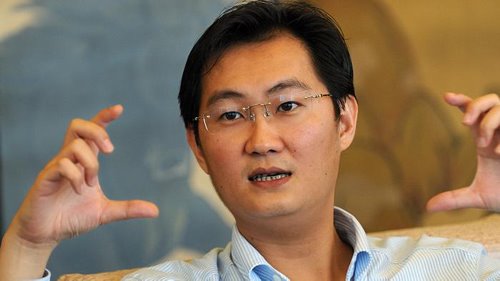當(dāng)前位置: Language Tips> 雙語(yǔ)新聞
'Sharing economy' seen as next big force
分享到

Ma Huateng, founder, chairman and CEO of Tencent Holdings, will make five suggestions at the National People's Congress annual session, which opens on Saturday, in areas including the development of a sharing economy, Internet-based medical services and security of the Internet ecosystem.
騰訊公司創(chuàng)始人、董事會(huì)主席兼首席執(zhí)行官馬化騰5日在全國(guó)人大會(huì)議上提交五項(xiàng)建議,內(nèi)容涉及分享經(jīng)濟(jì)的發(fā)展,互聯(lián)網(wǎng)醫(yī)療服務(wù)及互聯(lián)網(wǎng)生態(tài)安全。
The sharing economy will become a new driving force in China's economic growth and will help push the service industry as the main engine of the economy, said Ma, whose company is China's largest Internet service portal.
騰訊公司是中國(guó)最大的互聯(lián)網(wǎng)服務(wù)門(mén)戶(hù),馬化騰表示分享經(jīng)濟(jì)將成為推動(dòng)中國(guó)經(jīng)濟(jì)發(fā)展的新動(dòng)力,助力服務(wù)業(yè)成為拉動(dòng)中國(guó)經(jīng)濟(jì)的主引擎。
Sharing economy refers to a phenomenon where individuals share their spare resources via third-party online platforms to make money. Ride-sharing service apps Uber and Didi Kuaidi and lodging website Airbnb are examples of popular online platforms for the sharing economy.
分享經(jīng)濟(jì)是指?jìng)€(gè)體通過(guò)第三方網(wǎng)絡(luò)平臺(tái)分享其閑置資源從而獲得收入。租車(chē)服務(wù)軟件“優(yōu)步”和“滴滴快的”以及住宿網(wǎng)站Airbnb均為分享經(jīng)濟(jì)的網(wǎng)絡(luò)平臺(tái),頗受人們的青睞。
The market size for the sharing economy in the country surpassed 1 trillion yuan ($152.8 billion) in 2015, while the sharing economy in the United States was worth more than 3 trillion yuan and accounted for 3 percent of US GDP last year, Ma said in his suggestions.
馬化騰在其建議中指出,2015年中國(guó)分享經(jīng)濟(jì)市場(chǎng)規(guī)模超過(guò)1萬(wàn)億元,而同年美國(guó)分享經(jīng)濟(jì)總量超過(guò)3萬(wàn)億元,占美國(guó)GDP的比重為3%。
"The sharing economy still has considerable room for development in China," Ma said.
馬化騰說(shuō):“我國(guó)的分享經(jīng)濟(jì)還有很大發(fā)展空間。”
He cited several problems that are inhibiting the development of the sharing economy in China, including the need for an improved credit investigation system and better Internet infrastructure.
他還提出制約中國(guó)分享經(jīng)濟(jì)發(fā)展的幾個(gè)問(wèn)題,如國(guó)內(nèi)征信制度不夠健全,網(wǎng)絡(luò)基礎(chǔ)設(shè)施有待完善。
"The supervision of the sharing economy is still the same as that of traditional industries, which makes it difficult to innovate," he said.
馬化騰提到,“對(duì)于分享經(jīng)濟(jì)的監(jiān)管,仍然堅(jiān)持傳統(tǒng)行業(yè)的管理理念,不利于行業(yè)創(chuàng)新”。
Tencent, based in Shenzhen, Guangdong province, is active in the Internet Plus campaign. It signed strategic cooperative agreements with 45 cities in 13 provinces and autonomous regions across China last year to help them transform their economic development through big data, cloud computing and other technologies.
騰訊公司積極響應(yīng)國(guó)家“互聯(lián)網(wǎng)+”戰(zhàn)略。2015年,騰訊公司與遍布國(guó)內(nèi)13個(gè)省份及自治區(qū)的共45座城市簽署戰(zhàn)略合作協(xié)議,幫助這些城市借助大數(shù)據(jù)和云計(jì)算等技術(shù)實(shí)現(xiàn)經(jīng)濟(jì)發(fā)展轉(zhuǎn)型。
"In the Internet Plus age, we face more challenges in terms of information security. Traditional means are not updated enough to crack down on cybercrimes. China should build a security system to protect the mobile Internet ecosystem," Ma said.
馬化騰表示,“‘互聯(lián)網(wǎng)+’時(shí)代面臨更多的信息安全問(wèn)題挑戰(zhàn)。面對(duì)新型網(wǎng)絡(luò)犯罪不斷轉(zhuǎn)化升級(jí),傳統(tǒng)打擊手段明顯滯后,應(yīng)全面構(gòu)建我國(guó)移動(dòng)互聯(lián)網(wǎng)生態(tài)安全體系。”
As for the suggestion concerning Internet-based medical services, Ma recommended that healthcare authorities encourage IT companies to participate in the development of graded diagnosis and treatment services in China.
在有關(guān)互聯(lián)網(wǎng)醫(yī)療服務(wù)的建議中,馬化騰建議醫(yī)療機(jī)構(gòu)積極鼓勵(lì)信息技術(shù)企業(yè)參與進(jìn)來(lái),共同推動(dòng)中國(guó)分級(jí)診療服務(wù)發(fā)展。
"With remote education and remote medical care via the Internet, we can strengthen medical training and cultivate more reliable doctors at the grassroots level," Ma said. "We should, especially, get the doctors at the grassroots level into the habit of using mobile medical devices to monitor the health condition of middle-aged and elderly people."
他還表示,“可通過(guò)遠(yuǎn)程教育與遠(yuǎn)程醫(yī)療等手段加強(qiáng)基層醫(yī)療培訓(xùn),培養(yǎng)更多合格的值得信賴(lài)的醫(yī)生。特別是,培養(yǎng)基層醫(yī)生使用移動(dòng)醫(yī)療設(shè)備的習(xí)慣,做好中老年人的健康管理。”
To optimize the allocation of medical resources, Ma advised the government to remove the "hidden obstacles" that prevent doctors from becoming freelancers.
馬化騰向政府提議,應(yīng)逐步消除讓醫(yī)生成為“自由人”的“隱性障礙”,從而優(yōu)化醫(yī)療資源的配置效率。
He also proposed the establishment of a system for electronic health records, optimized for mobile Internet devices, so that individuals and hospitals both have convenient access to information.
他還提議建立電子健康檔案制度,使個(gè)人和醫(yī)院能夠利用移動(dòng)互聯(lián)設(shè)備便利地獲取健康信息。
英文來(lái)源:中國(guó)日?qǐng)?bào)
譯者:柳青
審校&編輯:yaning
上一篇 : 政府工作報(bào)告中的新亮點(diǎn)
下一篇 : 沉迷刷屏的人 可能短暫失聰
分享到
關(guān)注和訂閱


口語(yǔ)
關(guān)于我們 | 聯(lián)系方式 | 招聘信息
電話:8610-84883645
傳真:8610-84883500
Email: languagetips@chinadaily.com.cn